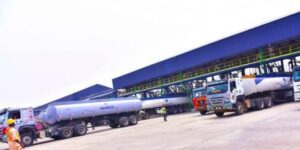


Energy group laments high importation of fuel amid NNPCL decision to patronise local refineries
The Energy Reforms Advocates of Nigeria (ERAN) has raised concerns over the increasing importation of petroleum products in Nigeria, despite recent commitments by the Nigerian National Petroleum Corporation Limited (NNPCL) to end imports and prioritise local refineries.
The group criticised the management of the nation’s energy sector, labeling recent changes in NNPCL leadership as superficial.
In a statement issued on Monday, the Executive Director of ERAN, Robinson Onuh, highlighted discrepancies between NNPCL’s public promises and its actions.
Onuh’s comments come days after the removal of Umar Ajiya and Oritsemeyiwa Eyesan from their roles as Chief Financial Officer and Executive Vice President (Upstream) of NNPCL, respectively.
The shakeup, announced Wednesday night, was described by NNPCL as an effort to enhance corporate governance and operational efficiency.
However, Onuh dismissed the changes as a “face-saving” strategy by NNPCL’s Group Chief Executive Officer (GCEO), Mele Kyari, amid increasing public calls for his resignation.
“This is cheating and to be clever by half,” Dr. Onuh said, accusing Kyari, along with Farouk Ahmed of the Nigerian Midstream and Downstream Petroleum Regulatory Authority (NMDPRA) and Engr. Gbenga Komolafe of the Nigerian Upstream Petroleum Regulatory Commission (NUPRC), of being the root cause of the sector’s challenges.
Onuh lambasted the NNPCL for what he described as “playing politics with people’s lives and the nation’s economy.”
He pointed to a report indicating that between October 1 and November 11, Nigeria imported 1.5 million metric tonnes of Premium Motor Spirit (PMS), 414,018 metric tonnes of diesel, and 13,500 metric tonnes of aviation fuel.
These volumes, he noted, translate to over 2 billion liters of petrol, 500 million liters of diesel, and 17 million liters of jet fuel, costing nearly N3 trillion cumulatively.
“The operational Dangote Refinery and the nation’s refineries remain in comatose, despite trillions of naira injected into them by the government,” Onuh said.
On Monday, Kyari had announced at a conference of the Nigerian Association of Petroleum Explorationists in Lagos that NNPCL and oil marketers had resolved to end fuel importation by patronizing locally refined products, a move that drew widespread commendation.
However, a subsequent statement issued on Thursday by NNPCL spokesperson Olufemi Soneye clarified that Kyari’s remarks were misinterpreted.
According to Soneye, Kyari had emphasised prioritising local refinery patronage rather than an outright cessation of fuel imports.


